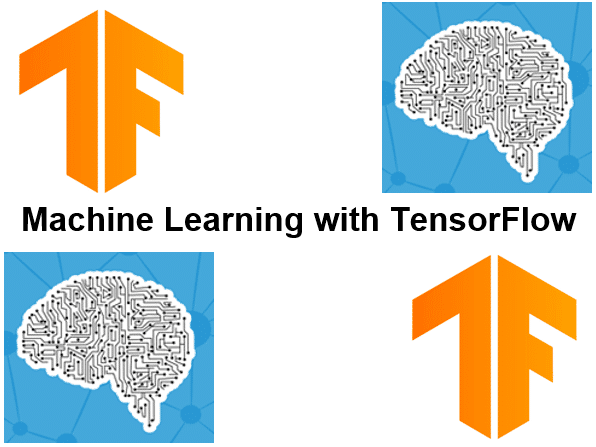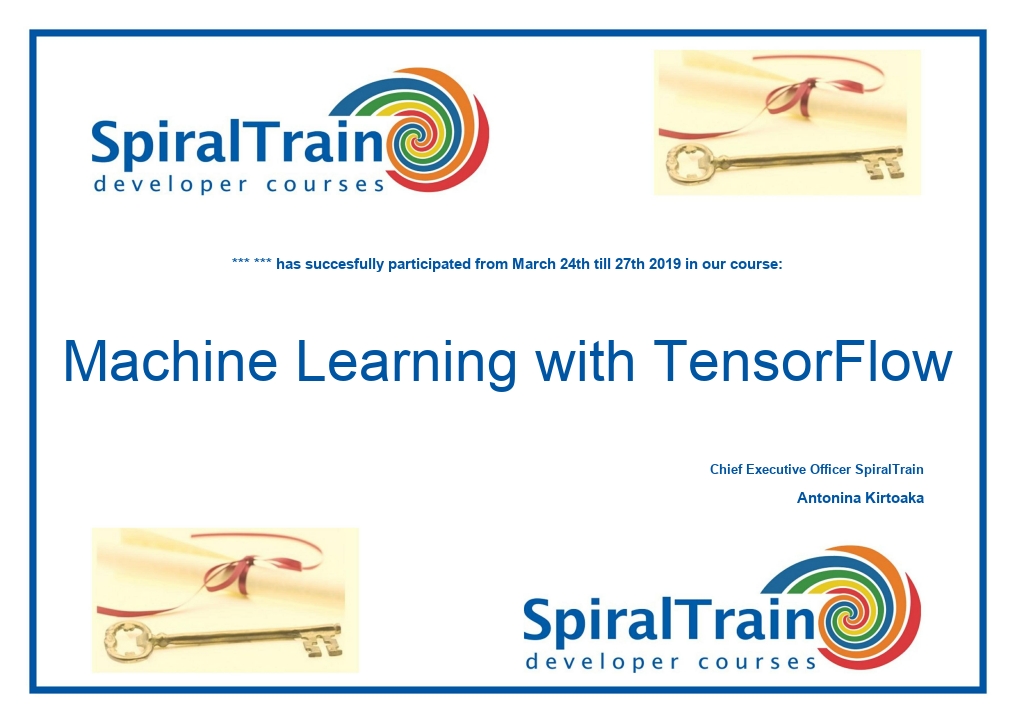-
Learning by doing
-
Trainers with practical experience
-
Classroom training
-
Detailed course material
-
Clear content description
-
Tailormade content possible
-
Training that proceeds
-
Small groups
In the course Machine Learning with TensorFlow from SpiralTrain participants learn to implement machine learning and deep learning applications with the open source TensorFlow framework. TensorFlow comes from Google and uses Python. With TensorFlow you can train and implement neural networks for number classification, image recognition and other problems.
The course Machine Learning with TensorFlow starts with an overview of the basic principles of Machine Learning and an explanation of the differences of Supervised, Unsupervised and Deep Learning. The data types of TensorFlow like vectors, arrays, lists and scalars are treated and the Colab and DataBricks development environments are discussed.
Subsequently the Machine Learning with TensorFlow course pays attention to the central Tensor Data Structure, which can be regarded as a container in which data in N dimensions can be stored. Rank, shape and type of tensors are discussed and TensorFlow operations and sessions are also treated.
Special attention is given to neural networks in which both Convolutional and Recurrent Neural Networks are explained. Convolution and Pooling, making connections between Input Neurons and Hidden Layers are also discussed.
The Visualization of models with TensorBoard is also part of the Machine Learning with TensorFlow course. Supervised Learning with Linear and Logistic Regression are reviewed and Ensemble techniques and Gradient Boosting are explained.
In addition the course Machine Learning with TensorFlow deals with Natural Language Processing with tokenization and text classification. Spam detection serves as an example and also Deep Learning is on the course schedule.
Various TensorFlow Optimizers such as Stochastic Gradient Descent, Gradient clipping and Momentum are discussed as well. And also Image Processing with Dimensionality Reduction and using the Keras APIs is covered.
Finally the course Machine Learning with TensorFlow ends with a discussion of models in production. Models as REST Service and Keras Based Models are treated.
The course Machine Learning with TensorFlow is intended for data scientists who want to use Python and the TensorFlow machine learning libraries to make predictions based on models.
To participate in this course knowledge of and experience with Python is required and knowledge of data analysis libraries such as Numpy, Pandas and Matplotlib is desirable.
The theory is discussed on the basis of presentations. Illustrative demos clarify the concepts. The theory is interchanged with exercises. The Anaconda distribution with Jupyter notebooks is used as a development environment. Course times are from 9:30 to 16:30.
After successful completion of the course participants receive an official certificate Machine Learning with TensorFlow.

Module 1 : Intro TensorFlow |
Module 2 : Tensor Data Structure |
Module 3 : Neural Networks |
|
What is TensorFlow? Machine Learning Supervised Learning Unsupervised Learning Deep Learning Install Anaconda Install TensorFlow Colab and Databricks Vectors and Scalars Matrix Calculations |
Arrays and Lists Multiple Dimensions Rank, Shape and Type TensorFlow Dimensions Tensor Manipulations TensorFlow Graphs Variables and Constants TensorFlow Operations TensorFlow Sessions Placeholders |
What are Neural Networks? Convolutional Neural Networks Multiple Layers of Arrays Local respective fields Convolution and Pooling Connecting Input Neurons Hidden Layers Recurrent Neural Networks Sequential Approach Layer Independence |
Module 4 : Tensor Board |
Module 5 : Supervised Learning |
Module 6 : Natural Language Processing |
|
Data Visualization Data Flow Graph High Level Blocks High Degree Nodes Node Representations Sequence Numbered Nodes Connected Nodes Operation Nodes Summary Nodes Reference Edge |
Linear Regression Keras and TensorFlow Correlation Graph Pairplot Logistic Regression Categorical Outcomes Sigmoid Function Boosted Trees Ensemble Technique Gradient Boosting |
NLP Overview NLP Curves Text Preprocessing Tokenization Spam Detection Word Embeddings Deep Learning Model Text Classification Text Processing TensorFlow Projector |
Module 7 : TensorFlow Optimizers |
Module 8 : Image Processing |
Module 9 : Models in Production |
|
Stochastic Gradient Descent Gradient clipping Momentum Nesterov momentum Adagrad Adadelta RMSProp Adam Adamax SMORMS3 |
Convolution Layer Pooling Layer Fully Connected Layer Keras API's ConvNets Transfer Learning Autoencoders Dimensionality Reduction Compression Techniques Variational Autoencoders |
Model Deployment Isolation Collaboration Model Updates Model Performance Load Balancer Model as REST Service Templates Keras Based Models Flask Challenges |
